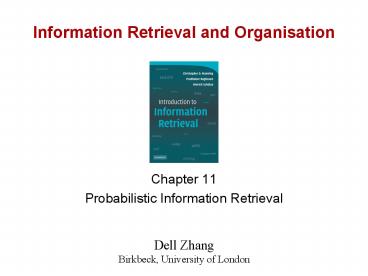Information Retrieval and Organisation PowerPoint PPT Presentation
1 / 8
Title: Information Retrieval and Organisation
1
Information Retrieval and Organisation
- Chapter 11
- Probabilistic Information Retrieval
Dell Zhang Birkbeck, University of London
2
Why Probabilities in IR?
Query Representation
User Information Need
Understanding of user need is uncertain
How to match?
Uncertain guess of whether document has relevant
content
Document Representation
Documents
In IR systems, matching between each document and
query is attempted in a semantically imprecise
space of index terms. Probabilities provide a
principled foundation for uncertain
reasoning. Can we use probabilities to quantify
our uncertainties?
3
Why Probabilities in IR?
- Problems with vector space model
- Ad-hoc term weighting schemes
- Ad-hoc basis vectors
- Ad-hoc similarity measurement
- We need something more principled!
4
Probability Ranking Principle
- The document ranking method is the core of an IR
system - We have a collection of documents. The user
issues a query. A list of documents needs to be
returned. - In what order do we present documents to the
user? We want the best document to be first,
second best second, etc.
5
Probability Ranking Principle
- If a reference retrieval system's response to
each request is a ranking of the documents in the
collection in order of decreasing probability of
relevance to the user who submitted the request,
where the probabilities are estimated as
accurately as possible on the basis of whatever
data have been made available to the system for
this purpose, the overall effectiveness of the
system to its user will be the best that is
obtainable on the basis of those data.
van Rijsbergen (1979113-114)
6
Probability Ranking Principle
- Theorem. The PRP is optimal, in the sense that it
minimizes the expected loss (also known as the
Bayes risk) under 1/0 loss. - Provable if all probabilities are known correctly.
7
Binary Independence Model
- BIM is the model that has traditionally been used
in conjunction with PRP - Binary Boolean documents and queries are
represented as binary incidence vectors of terms. - Independence terms occur in documents and
queries independently.
BIM Bernoulli Naive Bayes model
8
Binary Independence Model
- Use Bayes Rule
9
Binary Independence Model
- Rank documents by their odds
constant
10
Binary Independence Model
- Make the Naïve Bayes conditional independence
assumption
11
Binary Independence Model
- Let
12
Binary Independence Model
- Assume that
constant
constant
useful
13
Binary Independence Model
- Taking the logarithm function which is monotonic,
we get the retrieval status value
log odds ratio
14
Binary Independence Model
- Assume that relevant documents are a very small
percentage
IDF
15
Okapi BM25
- Assume that
- Factor in the term frequencies (tf) and document
length (Ld and Lave)
Ideally the parameters k1, b should be tuned on a
validation set.
Practically good vales 1.2 k1 2 b 0.75
16
Appraisal
- Getting reasonable approximations of
probabilities is possible, but requires
restrictive assumptions. In the BIM, these are - a Boolean representation of documents/queries/rele
vance - term independence
- terms not in the query dont affect the outcome
- document relevance values are independent
- Problem either require partial relevance
information or only can derive somewhat inferior
term weights.
17
Appraisal
- Probabilistic methods are one of the oldest but
also one of the currently hottest topics in IR. - Traditionally neat ideas, but theyve never won
on performance. - It may be different now. For example, the Okapi
BM25 term weighting formulas have been very
successful, especially in TREC evaluations.
18
Well-Known UK Researchers
Stephen Robertson
Keith van Rijsbergen
Karen Sparck Jones

